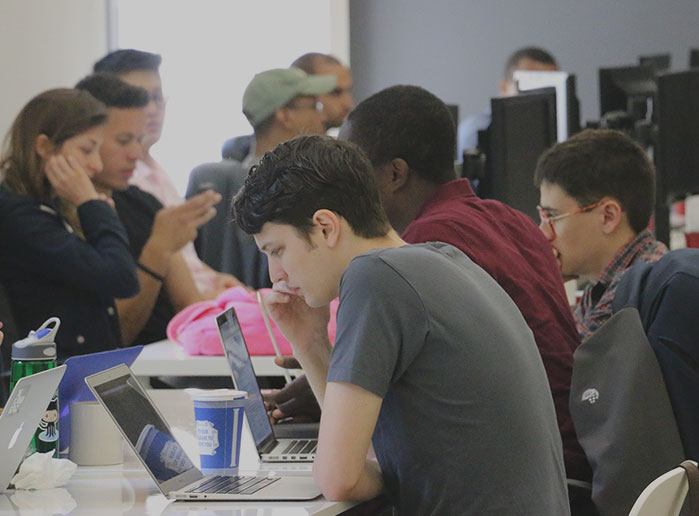This post was originally published on Quora in response to this question.
When a curious potential coding bootcamper turned to Quora to ask what bootcamps are looking for in a student, Flatiron School Co-Founder, Adam Enbar, stepped in with some advice (that’s now helped almost 12K readers). Whether you’re actively applying to bootcamps, know a friend who is, or just thinking about learning to code, we hope this helps you take the next step to the career and life you want.
“As a co-founder at Flatiron School, I lead the admissions process for our first two years. At this point I’ve interviewed thousands of candidates, and have had to make a lot of really hard decisions about which people to select for our courses. People put a lot of faith in us to make a huge difference in their lives, and that’s not a decision we take lightly. We want to admit people who can get through the course, work well with others, and get enough out of the experience to come away with a different direction in life.
Honestly, there’s so much demand for these skills that acceptances rates are low across the board at programming schools (ours is ~6% as of 2015 for our in-person NYC courses). For both our online and in-person courses, we do only try to accept people we know will be successful. That’s not because we don’t believe anyone can learn this (we could build a big company, really fast, if we admitted everyone who applied). Once a student is admitted to Flatiron School, we do everything in our power to make sure that student is successful. We’ve never kicked someone out.
In general, here’s what we look for in our process.
Cultural Fit
We see programming as a creative endeavor and we work hard to bring people together that can boost the creativity of the entire group, whether they’re learning online or in a classroom setting. As such, big goal of the admissions process is to create a student body that’s purposefully diverse. While this certainly means diversity in terms of race, ethnicity, and gender (we work closely with a few organizations to include underrepresented groups and have and entire fellowship program in partnership with the city of New York to that end), we go out of our way to seek diversity of backgrounds, experiences, and perspectives. We like to bring together amazing people, that normally would not have found each other. These have included venture capitalists, entrepreneurs, professional athletes, chemists, pro-poker players, and literal rocket scientists.
Aptitude
Our students are really freaking smart. Our courses are intense, so we want applicants that show the intellectual stamina they’ll need to pick up material and get through it, but there’s more to it than that. Being smart enough to get in here doesn’t necessarily mean you need to be college-educated.
There’s a misconception that programmers are employed to be quantitatively minded factory workers who churn out code. It turns out, that it’s less assembly line work than it is art.
I once asked Yoav Shapira, former VP of Engineering at HubSpot (company), what he thought HubSpot’s programmers would be doing if they were born 100 years ago. He said. “I really think they would be musicians.”
Like being a musician, being a programmer has a lot to do with composition and synthesis—creating fully realized code in a common language of moving parts and patterns. It’s a mode of expression that requires people to think about problems in highly structured ways. So we keep an eye out for creative people who have already proved they can think this way.
Software is ultimately about creating for people. Whether it’s in the structure of your code or the front-end user experience, it’s a medium that takes a kind of creative empathy to leverage effectively. If you’re a great communicator, you might have this kind of aptitude, and it is way more important to our admissions than where you went to school or how good you are at coding when you apply.
Passion
We want to know you are passionate about learning to code and don’t just see it as a means to an end—as a way to get a cool job or start a tech startup. While those are perfectly good reasons for learning this, we’re looking for people who see this as a craft to which they want to devote their careers.
This is actually one of the hardest things for us to assess in the admissions process. Usually we look for people who’ve at least started learning to code on their own, (here’s a good example- Dear Flatiron). There are tons of free resources to get you started (including our Free Intro To Ruby Track), and if you haven’t even tried those, how can you know whether or not you really want to be a programmer? You don’t have to be an expert, but you should at least know you love it before applying.
At the very least, we look for people who’ve demonstrated the ability to be passionate about something. Do you love to cook? Are you a scrabble champion? Do you blog prolifically or volunteer often? Let us know.
At Flatiron, all students deploy applications. We look for the type of person that doesn’t want to build something using what they know, rather someone who wants to build something that will force them to learn something new (here’s an example of an Angular.js project by recent alum Magdalena). Be intellectually curious and genuinely excited about this.
Grit
Grit is passion and perseverance for long-term goals, and it’s a predictor of success that transcends both talent and the ability to learn faster than others.
Today, it’s easier than ever to learn how to program, but it can still be an incredibly frustrating, arduous process, whether you’re in a program or teaching yourself. It’s hard, and we want our students to be successful, not just early in their careers, but 20 years down the line because we gave them the skills to continue learning. It takes a lot of grit to do that.
The selection process definitely isn’t arbitrary, but we do have to make tough choices. So it comes down to admitting the people we think will make amazing things together rather than simply outstanding individuals. If you’re demonstrably smart, kind, totally excited about learning, and think really hard about how to best express this in your application, you’ll likely stand out. ”
Interested in seeing if coding is for you? You can get started for free with our Intro To Ruby Course, build with real world tools and developing environments to give you a taste of life as a programmer.
Written byNICOLE KROESE
Director of Marketing, Flatiron School

